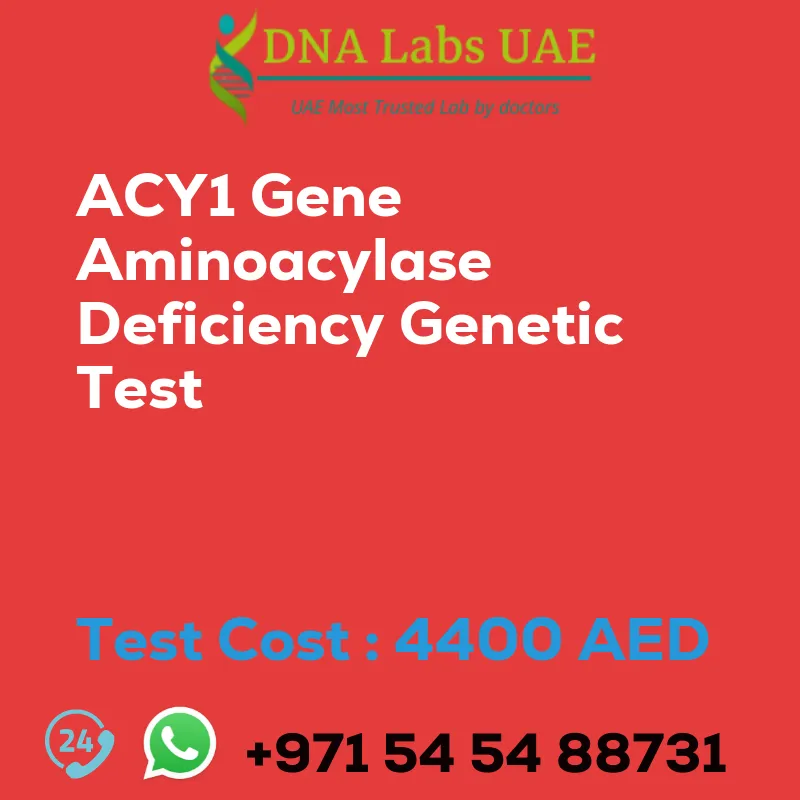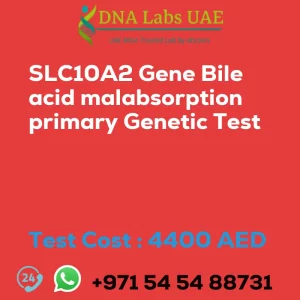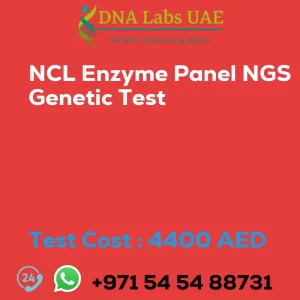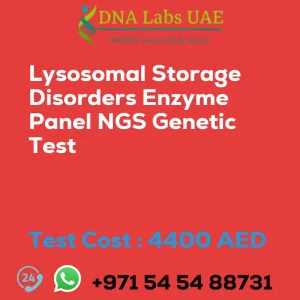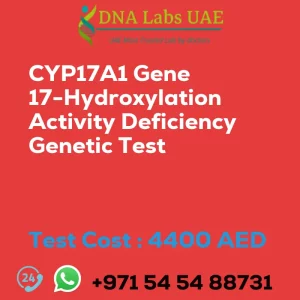ACY1 Gene Aminoacylase deficiency Genetic Test
Components
- Test Name: ACY1 Gene Aminoacylase deficiency Genetic Test
- Price: 4400.0 AED
- Sample Condition: Blood
- Report Delivery: 3 to 4 Weeks
- Method: NGS Technology
- Test Type: Metabolic Disorders
- Doctor: General Physician
- Test Department: Genetics
Pre Test Information
Clinical History of Patient who is going for ACY1 Gene Aminoacylase deficiency NGS Genetic DNA Test. A Genetic Counselling session to draw a pedigree chart of family members affected with Aminoacylase deficiency.
Test Details
ACY1 gene aminoacylase deficiency is a rare genetic disorder that affects the ACY1 gene. This gene provides instructions for producing an enzyme called aminoacylase 1, which is involved in breaking down certain amino acids in the body. Aminoacylase 1 deficiency is an autosomal recessive disorder, meaning that an individual must inherit two copies of the mutated ACY1 gene (one from each parent) in order to develop the condition.
People with ACY1 gene aminoacylase deficiency may have a reduced or absent activity of the aminoacylase 1 enzyme, leading to a buildup of certain amino acids in the body. This genetic condition can cause a range of symptoms, including developmental delay, intellectual disability, seizures, muscle weakness, and problems with movement and coordination. Some affected individuals may also have distinctive facial features, such as a prominent forehead and widely spaced eyes.
NGS (Next-Generation Sequencing) genetic testing is a type of genetic testing that uses advanced technology to rapidly sequence large amounts of DNA. It can be used to identify specific mutations or variations in the ACY1 gene that may be responsible for aminoacylase 1 deficiency. NGS testing can help confirm a diagnosis, provide information about the specific genetic changes involved, and help guide treatment and management options.
Genetic testing for ACY1 gene aminoacylase deficiency may be recommended for individuals with symptoms suggestive of the condition, as well as for their family members. It is typically performed on a blood or saliva sample and can be ordered by a healthcare provider or genetic counselor. It’s important to note that genetic testing for ACY1 gene aminoacylase deficiency may not be available in all regions and may require specialized testing facilities. Additionally, genetic testing is just one tool in the diagnostic process, and a comprehensive evaluation by a healthcare professional is necessary to confirm a diagnosis.
| Test Name | ACY1 Gene Aminoacylase deficiency Genetic Test |
|---|---|
| Components | |
| Price | 4400.0 AED |
| Sample Condition | Blood |
| Report Delivery | 3 to 4 Weeks |
| Method | NGS Technology |
| Test type | Metabolic Disorders |
| Doctor | General Physician |
| Test Department: | Genetics |
| Pre Test Information | Clinical History of Patient who is going for ACY1 Gene Aminoacylase deficiency NGS Genetic DNA Test A Genetic Counselling session to draw a pedigree chart of family members affected with Aminoacylase deficiency |
| Test Details |
ACY1 gene aminoacylase deficiency is a rare genetic disorder that affects the ACY1 gene. This gene provides instructions for producing an enzyme called aminoacylase 1, which is involved in breaking down certain amino acids in the body. Aminoacylase 1 deficiency is an autosomal recessive disorder, meaning that an individual must inherit two copies of the mutated ACY1 gene (one from each parent) in order to develop the condition. People with ACY1 gene aminoacylase deficiency may have a reduced or absent activity of the aminoacylase 1 enzyme, leading to a buildup of certain amino acids in the body. This genetic condition can cause a range of symptoms, including developmental delay, intellectual disability, seizures, muscle weakness, and problems with movement and coordination. Some affected individuals may also have distinctive facial features, such as a prominent forehead and widely spaced eyes. NGS (Next-Generation Sequencing) genetic testing is a type of genetic testing that uses advanced technology to rapidly sequence large amounts of DNA. It can be used to identify specific mutations or variations in the ACY1 gene that may be responsible for aminoacylase 1 deficiency. NGS testing can help confirm a diagnosis, provide information about the specific genetic changes involved, and help guide treatment and management options. Genetic testing for ACY1 gene aminoacylase deficiency may be recommended for individuals with symptoms suggestive of the condition, as well as for their family members. It is typically performed on a blood or saliva sample and can be ordered by a healthcare provider or genetic counselor. It’s important to note that genetic testing for ACY1 gene aminoacylase deficiency may not be available in all regions and may require specialized testing facilities. Additionally, genetic testing is just one tool in the diagnostic process, and a comprehensive evaluation by a healthcare professional is necessary to confirm a diagnosis. |

